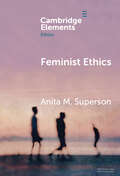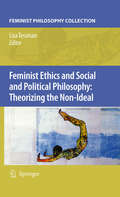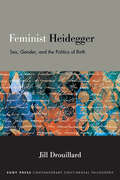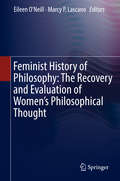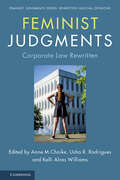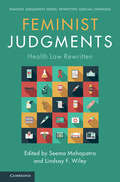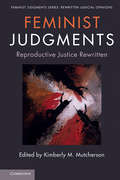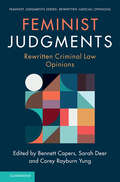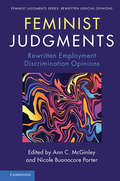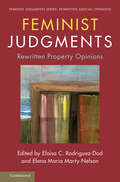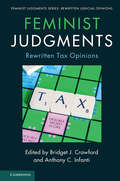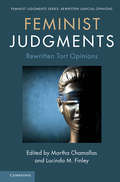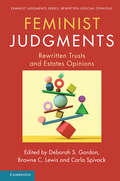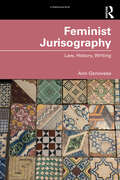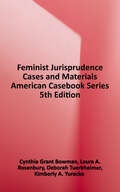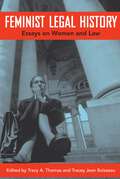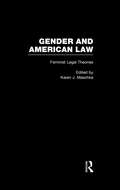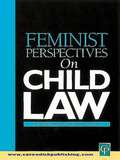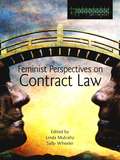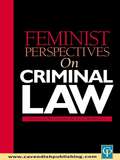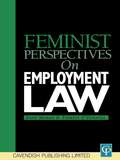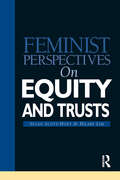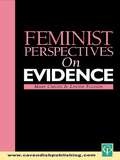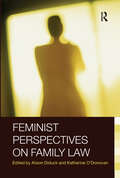- Table View
- List View
Feminist Ethics (Elements in Ethics)
by Anita M. SupersonFeminist Ethics provides an overview of feminist contributions to normative ethics, moral psychology, and metaethics. It argues that through their criticisms of traditional ethics and proposals for changes, feminists are advancing 'robust agency,' an account of ideal moral and rational agency that promises to give us better responses than those given in traditional ethics to problems in ethics, including how we know our duties, the kind of persons we should strive to become, and why we should act morally.
Feminist Ethics and Social and Political Philosophy: Theorizing the Non-Ideal
by Lisa TessmanFeminist Ethics and Social and Political Philosophy: Theorizing the Non-Ideal is a collection of feminist essays that self-consciously develop non-idealizing approaches to either ethics or social and political philosophy (or both). Characterizing feminist ethics and social and political philosophy as marked by a tendency to be non-idealizing serves to thematize the volume, while still allowing the essays to be diverse enough to constitute a representation of current work in the fields of feminist ethics and social and political philosophy. Each of the essays either serves as an instance of work that is rooted in actual, non-ideal conditions, and that, as such, is able to consider any of the many questions relevant to subordinated people; or reflects theoretically on the significance of non-idealizing as an approach to feminist ethics or social and political philosophy. The volume will be of interest to feminist scholars from all disciplines, to academics who are ethicists and political philosophers as well as to graduate students.
Feminist Heidegger: Sex, Gender, and the Politics of Birth (SUNY series in Contemporary Continental Philosophy)
by Jill DrouillardA feminist reading of how Heidegger may have responded to an unanswered questioned he posed in 1923, "Problem: What is woman?" while using his thought to better understand how contemporary society replies to questions in the realms of law, bioethics, pedagogy, and politics.This book begins with an unexplored and unanswered question that Martin Heidegger raises in a 1923 Freiburg course: "Problem: What is woman?" Yet, why should we care that Heidegger raises this "problem"? What could he, a member of the National Socialist Party, help feminists understand about responding to "the woman question"? How can Heidegger help us understand our own historical climate in which this question continues to hold significance? Jill Drouillard divides Heidegger's thought into two categories to think about the sexed/gendered experiences that coordinate our birth: (1) the one that suspends "the woman question" and that provides useful resources for thinking the fluidity of sex/gender, and (2) the one that provides a totalized reply to this query by manipulating tropes of the feminine to advance a politico-poetic project of Nazi politics. She uses Heidegger as a cautionary tale to demonstrate the harm that occurs when society tries to define the being (or "what is") of woman in any definite sense. In some chapters, she teases apart how Heidegger may have offered a reply to "the woman question" and, in others, shows what happens in today's society when law, bioethics, politics, and pedagogy reckon with this query.
Feminist History of Philosophy: The Recovery And Evaluation Of Women's Philosophical Thought
by Eileen O’Neill Marcy P. LascanoOver the course of the past twenty-five years, feminist theory has had a forceful impact upon the history of Western philosophy. The present collection of essays has as its primary aim to evaluate past women’s published philosophical work, and to introduce readers to newly recovered female figures; the collection will also make contributions to the history of the philosophy of gender, and to the history of feminist social and political philosophy, insofar as the collection will discuss women’s views on these issues.The volume contains contributions by an international group of leading historians of philosophy and political thought, whose scholarship represents some of the very best work being done in North and Central America, Canada, Europe and Australia.
Feminist Judgments
by Stanchi, Kathryn M. and Berger, Linda L. and Crawford, Bridget J. Kathryn M. Stanchi Linda L. Berger Bridget J. CrawfordWhat would United States Supreme Court opinions look like if key decisions on gender issues were written with a feminist perspective? Feminist Judgments brings together a group of scholars and lawyers to rewrite, using feminist reasoning, the most significant US Supreme Court cases on gender from the 1800s to the present day. The twenty-five opinions in this volume demonstrate that judges with feminist viewpoints could have changed the course of the law. The rewritten decisions reveal that previously accepted judicial outcomes were not necessary or inevitable and demonstrate that feminist reasoning increases the judicial capacity for justice. Feminist Judgments opens a path for a long overdue discussion of the real impact of judicial diversity on the law as well as the influence of perspective on judging.
Feminist Judgments: Corporate Law Rewritten (Feminist Judgment Series: Rewritten Judicial Opinions)
by Anne M. Choike Usha R. Rodrigues Kelli Alces WilliamsCorporate law has traditionally assumed that men organize business, men profit from it, and men bring cases in front of male judges when disputes arise. It overlooks or forgets that women are dealmakers, shareholders, stakeholders, and businesspeople too. This lack of inclusivity in corporate law has profound effects on all of society, not only on women's lives and livelihoods. This volume takes up the challenge to imagine how corporate law might look if we valued not only women and other marginalized groups, but also a feminist perspective emphasizing the importance of power dynamics, equity, community, and diversity in corporate law. Prominent lawyers and legal scholars rewrite foundational corporate law cases, and also provide accompanying commentary that situates each opinion in context, explains the feminist theories applied, and explores the impact the rewritten opinion might have had on the development of corporate law, business, and society.
Feminist Judgments: Health Law Rewritten (Feminist Judgment Series: Rewritten Judicial Opinions)
by Lindsay F. Wiley Seema MohapatraThis volume provides an alternate history of health law by rewriting key judicial opinions from a feminist perspective. Each chapter includes a rewritten opinion penned by a leading scholar relying exclusively on court precedents and scientific understanding available at the time of the original decision accompanied by commentary from an expert placing the case in historical context and explaining how the feminist judgment might have shaped a different path for subsequent developments. It provides a map of the health law field-where paternalism, individualism, gender stereotypes, and tensions over the public-private divide shape decisions about informed consent, medical and nursing malpractice, the relationships among health care professionals and the institutions where they work, end-of-life care, reproductive health care, biomedical research, ownership of human tissues and cells, the influence of religious directives on health care standards, health care discrimination, long-term care, private health insurance, Medicaid coverage, the Affordable Care Act, and more.
Feminist Judgments: Reproductive Justice Rewritten (Feminist Judgment Series: Rewritten Judicial Opinions)
by Kimberly M. MutchersonReproductive justice (RJ) is a pivotal movement that supplants the language and limitations of reproductive rights. RJ's tenets are that women have the human rights to decide if or when they'll become pregnant, whether to carry a pregnancy to term, and to parent the children they have in safe and healthy environments. Recognizing the importance of the rights at stake when the law addresses parenting and procreation, the authors in this book re-imagine judicial opinions that address the law's treatment of pregnancy and parenting. The cases cover topics such as forced sterilization, pregnancy discrimination, criminal penalties for women who take illegal drugs while pregnant, and state funding for abortion. Though some of the re-imagined cases come to the same conclusions as the originals, each rewritten opinion analyzes how these cases impact the most vulnerable populations, including people with disabilities, poor women, and women of color.
Feminist Judgments: Rewritten Criminal Law Opinions (Feminist Judgment Series: Rewritten Judicial Opinions)
by Sarah Deer Bennett Capers Corey Rayburn Yung'Is it possible to be both a judge and a feminist?' Feminist Judgments: Rewritten Criminal Law Opinions answers that question in the affirmative by re-writing seminal opinions that implicate critical dimensions of criminal law jurisprudence, from the sexual assault law to provocation to cultural defences to the death penalty. Right now, one in three Americans has a criminal record, mass incarceration and over-criminalization are the norm, and our jails cycle through about ten million people each year. At the same time, sexual assaults are rarely prosecuted at all, domestic violence remains pervasive, and the distribution of punishment, and by extension justice, seems not only raced and classed, but also gendered. We have had #MeToo campaigns and #SayHerName campaigns, and yet not enough has changed. How might all of justice look different through a feminist lens. This book answers that question.
Feminist Judgments: Rewritten Employment Discrimination Opinions (Feminist Judgment Series: Rewritten Judicial Opinions)
by Ann C. McGinley Nicole Buonocore PorterHow would feminist perspectives and analytical methods change the interpretation of employment discrimination law? Would the conscious use of feminist perspectives make a difference? This volume shows the difference feminist analysis can make to the interpretation of employment discrimination statutes. This book brings together a group of scholars and lawyers to rewrite fifteen employment discrimination decisions in which a feminist analysis would have changed the outcome or the courts' reasoning. It demonstrates that use of feminist perspectives and methodologies, if adopted by the courts, would have made a significant difference in employment discrimination law, leading to a fairer and more egalitarian workplace, and a more prosperous society.
Feminist Judgments: Rewritten Property Opinions (Feminist Judgment Series: Rewritten Judicial Opinions)
by Rodriguez-Dod, Eloisa C. Marty-Nelson, Elena MariaHow could feminist perspectives and methods change the shape of property law? This volume assembles a group of diverse scholars to explore this question by presenting fundamental property law cases rewritten from a feminist perspective. The cases cover a broad range of property law topics, from landlord-tenant rights and obligations, patents, and zoning to publicity rights, land titles, concurrent ownership, and takings. These rewritten opinions and their accompanying commentaries demonstrate how incorporating feminist theories and methods could have made property law more just and equitable for women and marginalized groups. The book also shows how property law is not neutral but is shaped by the society that produces it and the judges who apply it.
Feminist Judgments: Rewritten Tax Opinions (Feminist Judgment Series: Rewritten Judicial Opinions)
by Bridget J. Crawford Anthony C. InfantiCould a feminist perspective change the shape of tax laws? Feminist reasoning and analysis are recognized as having tremendous potential to affect employment discrimination, sexual harassment, and reproductive rights laws - but they can likewise transform tax law (as well as other statutory or code-based areas of the law). By highlighting the importance of perspective, background, and preconceptions on reading and interpreting statutes, this volume shows what a difference feminist analysis can make to statutory interpretation. Feminist Judgments: Rewritten Tax Opinionsbrings together a group of scholars and lawyers to rewrite tax decisions in which a feminist emphasis would have changed the outcome, the court's reasoning, or the future direction of the law. Featuring cases including medical expense deductions for fertility treatment, gender confirmation surgery, tax benefits for married individuals, the tax treatment of tribal lands, and business expense deductions, this volume opens the way for a discussion of how viewpoint is a key factor in statutory interpretation.
Feminist Judgments: Rewritten Tort Opinions (Feminist Judgment Series: Rewritten Judicial Opinions)
by Lucinda M. Finley Martha ChamallasBy rewriting both canonical and lesser-known tort cases from a feminist perspective, this volume exposes gender and racial bias in how courts have categorized and evaluated harm stemming from pre-natal malpractice, pregnancy loss, domestic violence, sexual assault and harassment, invasion of privacy, and the award of economic and non-economic damages. The rewritten opinions demonstrate that when confronted with gendered harm to women, courts have often distorted or misapplied conventional legal doctrine to diminish the harm or deny recovery. Bringing this implicit bias to the surface can make law students, and lawyers and judges who craft arguments and apply tort doctrines, more aware of inequalities of race, gender, class, and sexual orientation or identity. This volume shows the way forward to make the basic doctrines of tort law more responsive to the needs and perspectives of traditionally marginalized people, in ways that give greater value to harms that they disproportionately experience.
Feminist Judgments: Rewritten Trusts and Estates Opinions (Feminist Judgment Series: Rewritten Judicial Opinions)
by Browne C. Lewis Deborah S. Gordon Carla SpivackFor women and other marginalized groups, the reality is that the laws regulating estates and trusts may not be treating them fairly. By using popular feminist legal theories as well as their own definitions of feminism, the authors of this volume present rewritten opinions from well-known estates and trust cases. Covering eleven important cases, this collection reflects the diversity in society and explores the need for greater diversity in the law. By re-examining these cases, the contributors are able to demonstrate how women's property rights, as well as the rights of other marginalized groups, have been limited by the law.
Feminist Jurisography: Law, History, Writing
by Ann GenoveseThis book offers a jurisprudential meditation on and methodological performance of how feminist and legal thought come into relation. This book is about the conduct of one’s scholarship and why it requires examination. Across six essays, the book reintroduces official and unofficial jurisprudence writing of the late 20th century to show how disciplinary methods were transformed, and how relations between people and place, and between law and humanities, were transferred from the periphery to the centre of contemporary scholarship. To demonstrate this story, Feminist Jurisography experiments with genre, style, and form to historicise the relationship of a feminist jurisprudent to her own sources, methods, and interlocutors; and remind that it was feminist intellectuals from 1949 onwards who altered conducts of interdisciplinary scholarship in ways that are underacknowledged today. It exemplifies why naming a practice for yourself is an acknowledgment of relations of difference, collaboration, and inheritance, but also a performance of the feminist tradition of intellectual self-assertion that the book explores. The book will be a useful resource for scholars and students of law and humanities, feminism, and history, and of value to a general audience interested in feminist ideas. The book will benefit contemporary conversations about the history and status of feminist contributions to these fields.
Feminist Jurisprudence: Cases and Materials, Fifth Edition (American Casebook Series)
by Kimberly A. Yuracko Cynthia Grant Bowman Deborah Tuerkheimer Laura A. RosenburyThis coursebook introduces students to feminist jurisprudence. The first three chapters develop the historical range of feminist theories. Subsequent chapters examine topics such as violence, reproduction, intimate relationships, children, employment, and education. Extensive readings, cases, and text notes encourage detailed, rigorous analysis and critical thinking.
Feminist Legal History: Essays on Women and Law
by Bettye Collier-ThomasAttuned to the social contexts within which laws are created, feminist lawyers, historians, and activists have long recognized the discontinuities and contradictions that lie at the heart of efforts to transform the law in ways that fully serve women’s interests. At its core, the nascent field of feminist legal history is driven by a commitment to uncover women’s legal agency and how women, both historically and currently, use law to obtain individual and societal empowerment.Feminist Legal History represents feminist legal historians’ efforts to define their field, by showcasing historical research and analysis that demonstrates how women were denied legal rights, how women used the law proactively to gain rights, and how, empowered by law, women worked to alter the law to try to change gendered realities. Encompassing two centuries of American history, thirteen original essays expose the many ways in which legal decisions have hinged upon ideas about women or gender as well as the ways women themselves have intervened in the law, from Elizabeth Cady Stanton’s notion of a legal class of gender to the deeply embedded inequities involved in Ledbetter v. Goodyear, a 2007 Supreme Court pay discrimination case.Contributors: Carrie N. Baker, Felice Batlan, Tracey Jean Boisseau, Eileen Boris, Richard H. Chused, Lynda Dodd, Jill Hasday, Gwen Hoerr Jordan, Maya Manian, Melissa Murray, Mae C. Quinn, Margo Schlanger, Reva Siegel, Tracy A. Thomas, and Leti Volpp
Feminist Legal Theories (Gender and American Law: The Impact of the Law on the Lives of Women)
by Karen J. MaschkeMultidisciplinary focus Surveying many disciplines, this anthology brings together an outstanding selection of scholarly articles that examine the profound impact of law on the lives of women in the United States. The themes addressed include the historical, political, and social contexts of legal issues that have affected women's struggles to obtain equal treatment under the law. The articles are drawn from journals in law, political science, history, women's studies, philosophy, and education and represent some of the most interesting writing on the subject. The law in theory and practice Many of the articles bring race, social, and economic factors into their analyses, observing, for example, that black women, poor women, and single mothers are treated by the wielders of the power of the law differently than middle class white women. Other topics covered include the evolution of women's legal status, reproduction rights, sexuality and family issues, equal employment and educational opportunities, domestic violence, pornography and sexual exploitation, hate speech, and feminist legal thought. A valuable research and classroom aid, this series provides in-depth coverage of specific legal issues and takes into account the major legal changes and policies that have had an impact on the lives of American women.
Feminist Perspectives on Child Law (Feminist Perspectives)
by Daniel Monk Jo BridgemanFeminist Perspectives on Child Law is a collection of interdisciplinary socio-legal essays which explore the complex relationship between childhood,gender and the law. Drawing on a wide range of feminist and critical theories and empirical research, these original essays challenge the gender neutrality of law; they explore the shifting constructions of childhood by law, legal practice and popular culture; and they provide critical and timely insights into the complex relationship between adults and children. The essays go beyond the traditional boundaries of child law within the law school curriculum and within legal practice by addressing a wide range of issues, such as health, criminal justice, education, sexuality and domestic violence. By approaching these issues in innovative ways, the essays question the impact of gender on social and cultural understandings of childhood and on contemporary interpretations of child welfare and give voice to the different choices and experiences of male and female children.
Feminist Perspectives on Contract Law (Feminist Perspectives)
by Linda Mulcahy Sally WheelerThe law of contract is ripe for feminist analysis. Despite increasing calls for the re-conceptualisation of neo-classical ways of thinking, feminist perspectives on contract tend to be marginalised in mainstream textbooks. This edited collection questions the assumptions made in such works and the ideologies that underpin them, drawing attention to the ways in which the law of contract has facilitated the virtual exclusion of women, the feminine and the private sphere from legal discourse. Contributors to this volume offer a range of ways of thinking about the subject and cover topics such as the feminine offeree, feminist perspectives on contracts in cyberspace, the forgotten world of women and contracts, restitution and feminist economic theory, the gendered power dynamics of undue influence, and the feminisation of dispute resolution.
Feminist Perspectives on Criminal Law (Feminist Perspectives)
by Lois Bibbings Donald NicolsonFirst published in 2000. Routledge is an imprint of Taylor & Francis, an informa company.
Feminist Perspectives on Employment Law (Feminist Perspectives)
by Anne Morris Thérèse O'DonnellWhilst equal pay, maternity rights and sex discrimination, including sexual harassment, have received attention from feminist scholars, there is an increasing awareness that it is the whole of the working environment that must be examined if real progress is to be made.
Feminist Perspectives on Equity and Trusts (Feminist Perspectives)
by Hilary Lim Susan Scott-HuntPrevious collections of essays on equity and trusts law have focused on doctrinal issues, only occasionally giving a policy gloss or suggestion of social context and impact. Although a critical approach can be glimpsed in journal articles and student texts, this collection of essays draws together both feminist and critical material. It is unique in being written by feminists, in dealing with equity and trusts as a whole and in being written in the critical tradition.
Feminist Perspectives on Evidence
by Louise Ellison Mary ChildsQuestions of evidence and proof are fundamental to the operation of substantive law and to our understanding of law as a social practice. The study of evidence involves issues of central concern to feminist scholars,including matters of epistemology, psychology, allocation of risk and responsibility. Debates about evidence, like debates about feminism, involve questioning ideas of rationality and truth, as well as claims to knowledge both by and about men and women. Social constructions of gender are reflected both explicitly and implicitly in evidential rules and in the way in which evidence is received and understood by judges, jurors and magistrates. Feminist evidence scholarship is a relatively new but rapidly developing field. This collection brings together previously unpublished work by feminist legal scholars from different jurisdictions. In these essays, they explore the contributions of feminist theory and methodology to the understanding of the law of evidence.
Feminist Perspectives on Family Law (Feminist Perspectives)
by Alison Diduck Katherine O'DonovanExamining specific areas of family law from a feminist perspective, this book assesses the impact that feminism has had upon family law. It is deliberately broad in scope, as it takes the view that family law cannot be defined in a traditional way. In addition to issues of long-standing concern for feminists, it explores issues of current legal and political preoccupation such as civil partnerships, home-sharing, reproductive technologies and new initiatives in regulating family practices through criminal law, including domestic violence and youth justice.
